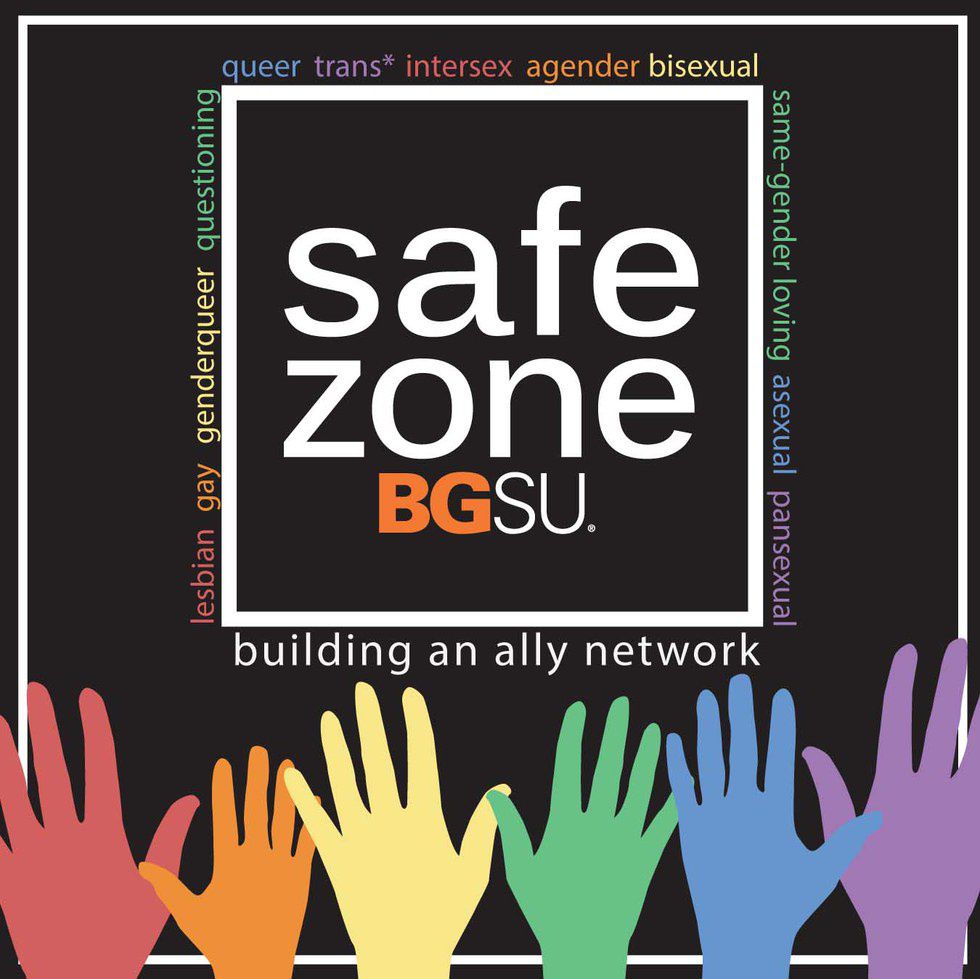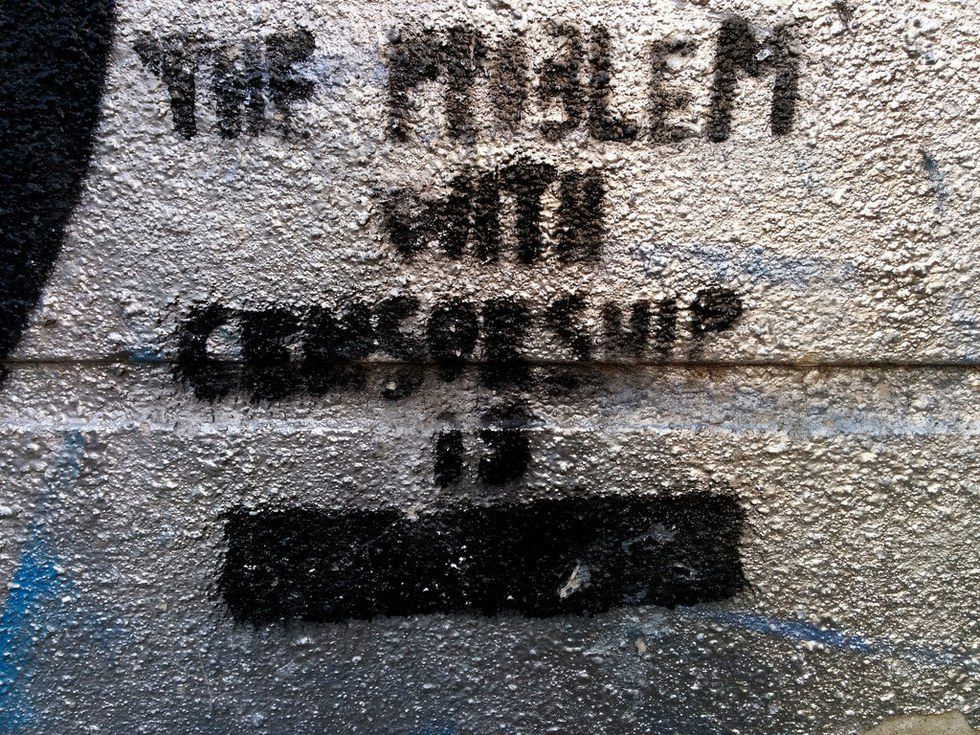In 2007, my college began an initiative called Safe Zone Ally Training, the origin of the laminated, rainbow-colored door signs that adorn the walls of various professors and RAs on my campus. The members of the community bearing these signs have, presumably, gone through an ally training program and are prepared to support members of marginalized communities, such as LGBT students or students of color. The idea seems pretty simple to me. If any student is in emotional turmoil or is being discriminated against, especially those who are more likely to be—read: minorities—then those who are part of the Safe Zone can be there for them and they can talk about a solution.
The Safe Zone program is simply a way to give students some guaranteed allies on campus who are there to support them. I think that’s a pretty awesome concept when you’re part of a minority that often faces some extra challenges. Basically, it's just a resource. It doesn't change anything major about the college experience, and still exposes students to everything they would be exposed to normally. The same goes for "trigger warnings", which warn trauma victims and those with other mental health issues about certain content before it's discussed, that way they can prepare themselves.
This family of ideas designed to facilitate the education of disadvantaged students has gained a large opposition. People argue that it's not necessary, that it's a form of "coddling", or the most far-fetched claim: that it takes away from the free exchange of ideas. I would understand this opinion if content warnings meant censoring any content, but they absolutely do not.
The University of Chicago, in its recent welcome letter to the incoming Class of 2020, stated that they "do not report so-called 'trigger warnings'" or "'safe spaces'" where "individuals can retreat from ideas and perspectives at odds with their own". Upon reading this, I almost laughed. This is not a profound statement. It amazes me that the Dean of Students is being celebrated for "defending" academic freedom as though it was being threatened in the first place. His definitions of "trigger warnings" and "safe spaces" are laced with misunderstanding and, dare I say, some prejudice against "ideas and perspectives at odds with [his] own".
Here are 10 things University of Chicago Dean of Students, John Ellison, would benefit from knowing:
1. A "safe space" does not imply full protection or immunity.
Like the ones offered at my school, a safe zone simply means a place where students can get support, much like the dorm room of a friend. It means they can talk about whatever is bothering them and someone will listen and let them be themselves. In a safe space, all it means is no one there will be sexist, racist, homophobic, or transphobic, so the student doesn't have to worry about discrimination. This doesn't mean the entire campus is a safe space; obviously, that is unrealistic.
Still, safe spaces contribute to a breaking down of discriminatory ideas overall, because if on-campus leaders such as professors and resident assistants state that they do not discriminate on the basis of race, gender identity, or sexual orientation, then the student body will emulate the example that is set. It doesn't mean that any student is getting "special treatment"; all students are welcome in safe spaces. Being given a few key people on campus that they can trust does not equal students being overly protected at all costs. Safe spaces don't protect anyone from anything. They're just a positive resource.
2. Safe spaces can actually help.
Minorities of any kind tend to have a harder time expressing themselves. If you're not a person of color or LGBT, you may not understand this, and that's okay. A transgender person, for example, may have abuse thrown at them for their identity or appearance on a daily basis. People of color hear racist comments frequently and are systemically discriminated against in the workplace and even the classroom.
So for students with these issues, it can help in their education to know that they have allies. Again, that's all a safe space is: Somewhere they aren't going to get hurt on the basis of personal qualities they can't control. They're not even meant to be on the entire campus; they're just there for some extra support. Where's the part that hinders free speech?
3. Though safe spaces are beneficial, minority students are strong and could go on without them.
Safe spaces have not always existed on campuses. Students can be fine without them. However, hate crimes, discrimination, and mental health issues such as depression still exist and are more prominent for minority youth. That being said, safe spaces give students a way to have support through these difficulties. No one is saying "Without this safe space I can't succeed in college." They're saying, "This space could help students' mental well-being without hindering classroom discussions or other learning initiatives." I certainly don't see a downside to that.
4. Trigger warnings are content warnings. That's it.
A "trigger warning" is not something that removes content. Much like the tiny words on a movie rating that say "Rated R for strong language and violence", a trigger warning is intended to give a heads-up to people with mental health issues who have sensitivity to certain content, whose issues may be "triggered" by certain content.
For example, if a military veteran with post-traumatic stress disorder were in a class and there were some scenes of war described in the next reading, there might be a note in the syllabus that said "Content Warning: Passage describes violent scenes of war." I can't stress enough that this is literally all it is. It affects nobody, except for benefiting the person with sensitivity to it.
5. Trigger warnings don't have anything to do with "political correctness".
The two terms are far apart in relevance. Content warnings prepare people with mental health difficulties, and political correctness involves changing what one is doing or saying to be more sensitive. The thing is, content warnings don't require any material or discussion to be changed whatsoever.
6. No one is scared of hearing ideas they disagree with... Except, maybe, the people who don't like safe spaces or content warnings.
As an LGBT student with depression and anxiety, I have never once have asked for content to be changed, for open discussions not to happen, or for people to filter themselves on my behalf. I believe in the free exchange of ideas, and so does everyone else who supports safe spaces and content warnings. The people who are speaking out against ideology simply because it differs from their own are people like the Dean of Students at the University of Chicago, who mistakenly thinks he's taken a stand against something that's not happening.
7. "Coddling": To treat in an indulgent or overprotective way.
When are students being indulged or overprotected? Safe spaces are an extremely small portion of one's college experience, if one even chooses to use them at all. Students would still get all the same exposure, including interacting with those who have differing viewpoints, as any college student ever.
8. Standing up against unjust treatment is not the same as babying someone.
School officials supporting these initiatives are not saying, "You will never face discrimination." They're trying to tell students that "You may face hardship, but you can trust us not to discriminate against you."
9. None of this is censorship.
Seriously, where is information not being exchanged? All class discussions are still taking place, and all class materials are being distributed freely. The assigned reading is still required for everyone. I am all for the free exchange of ideas, and if it were being threatened by any of this, I would be upset. But alas, it's not.
And finally...
10. The world is not an inherently dark, scary place.
Marginalized students don't need to experience prejudice in order to be "prepared for the real world". Proponents of safe spaces and trigger warnings are usually of the opinion that all students should get a college experience similar to the one they will likely get post-college: You'll meet a lot of kind people, a lot of folks that are not-so-kind, and you'll learn to deal with all of them. That includes being challenged. That includes hearing difficult statements in debates. But it will always include love and support as well. UChicago Dean of Students John Ellison, I hope all of your incoming students know that, too.










 Going to the cinema alone is good for your mental health, says science
Going to the cinema alone is good for your mental health, says science












 women in street dancing
Photo by
women in street dancing
Photo by  man and woman standing in front of louver door
Photo by
man and woman standing in front of louver door
Photo by  man in black t-shirt holding coca cola bottle
Photo by
man in black t-shirt holding coca cola bottle
Photo by  red and white coca cola signage
Photo by
red and white coca cola signage
Photo by  man holding luggage photo
Photo by
man holding luggage photo
Photo by  topless boy in blue denim jeans riding red bicycle during daytime
Photo by
topless boy in blue denim jeans riding red bicycle during daytime
Photo by  trust spelled with wooden letter blocks on a table
Photo by
trust spelled with wooden letter blocks on a table
Photo by  Everyone is Welcome signage
Photo by
Everyone is Welcome signage
Photo by  man with cap and background with red and pink wall l
Photo by
man with cap and background with red and pink wall l
Photo by  difficult roads lead to beautiful destinations desk decor
Photo by
difficult roads lead to beautiful destinations desk decor
Photo by  photography of woman pointing her finger near an man
Photo by
photography of woman pointing her finger near an man
Photo by  closeup photography of woman smiling
Photo by
closeup photography of woman smiling
Photo by  a man doing a trick on a skateboard
Photo by
a man doing a trick on a skateboard
Photo by  two men
two men  running man on bridge
Photo by
running man on bridge
Photo by  orange white and black bag
Photo by
orange white and black bag
Photo by  girl sitting on gray rocks
Photo by
girl sitting on gray rocks
Photo by  assorted-color painted wall with painting materials
Photo by
assorted-color painted wall with painting materials
Photo by  three women sitting on brown wooden bench
Photo by
three women sitting on brown wooden bench
Photo by 
 Photo by
Photo by  Photo by
Photo by  Photo by
Photo by  Photo by
Photo by 


 people sitting on chair in front of computer
people sitting on chair in front of computer











